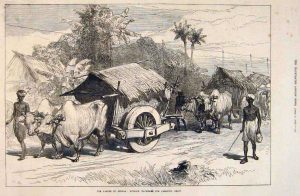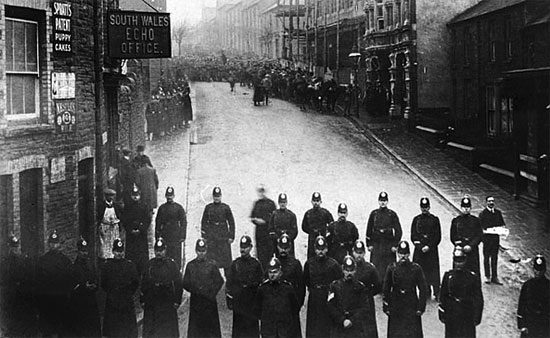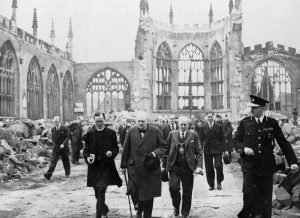
Myths: Fact vs Fiction
Churchill Sent Troops Against Striking Welsh Coal Miners

November 29, 2013
Leading Churchill Myths
by Randolph S. Churchill
From Finest Hour 140, Autumn 2008. Excerpted by kind permission from Winston S. Churchill, vol. 2 Young Statesman 1901-1911. London: Heinemann, 1977, 374-78.
In 1911, a strike began in the coal mines at Rhondda in early November of the same year. It arose out of a dispute concerning wage differentials in the working of hard and soft seams. Many men were involved, estimates varying between 25,000 and 30,000, and many different pits were affected.
There was looting and the local authorities appealed to the War Office for troops. On hearing of this, Churchill as Home Secretary consulted the Secretary of War, Haldane, and they agreed instead to send police, but to hold some troops in reserve near by.

2025 International Churchill Conference
Churchill’s whole conduct in the matter has since been grotesquely distorted, and it has become a part of socialist demonology that Churchill sent troops who fired upon the miners of Tonypandy. Socialist propagandists have sought to make martyrs of the miners of Tonypandy comparable to those of Tolpuddle in 1834.
Find the complete issue of Finest Hour 140 here.
Tonypandy in reality is only distinguished from the other Welsh villages involved because of the high degree of looting in which the miners indulged; but a lie once started can seldom be overtaken. Fortunately, a contemporary account of the truth survives in words written before the lie had ever been born:
WSC to the King
[10 November 1910]
Copy
Reports today from the whole of the Rhondda Valley are satisfactory. Absolute order has been maintained around all the threatened collieries. A few trifling incidents of window breaking have occurred in two of the villages. The 1,400 Police at the disposal of the Chief Constable will, it is expected, be able not merely to prevent attacks upon the collieries but to control the whole district and to deal promptly with any sign of a disorderly gathering large or small. No need for the employment of the military is likely to occur. They will be kept as far as possible out of touch with the population, while sufficiently near to the scene to be available if necessary….
With the view however of increasing the strength of the police force in the district to a point which will obviate all risk of having to use the military, two further contingents, aggregating 500 additional police, have been sent from London. The whole district is now in the effective control of the police, and there appears to be no reason at present why the policy of keeping the military out of direct contact with the rioters should be departed from.
A study of the contemporary Press confirms the facts set out in Churchill’s letter to the King. The fact that Churchill did not use troops against the miners is underlined by the fact that Lord Northcliffe’s Times, “ever strong upon the stronger side” as Hazlitt had earlier said of it, attacked him for not having used troops:
The Breakdown of Trade Unionism
The Times, leader, 9 November 1910 (excerpt)
The Chief Constable of Glamorgan…felt already on Monday night that the police could not cope with the situation alone, and applied to the local military authorities for troops. Yesterday, it appears, both cavalry and infantry were despatched by train for South Wales, but were stopped at Swindon in consequence of a consultation between the Home Secretary and Mr. Haldane. It was thought preferable to send more police instead and to hold back the troops….The renewed rioting late last night seems to have been of a most determined character, and if loss of life occurs, which we fear is more than possible, the responsibility will lie with the Home Secretary….Mr. Churchill hardly seems to understand that an acute crisis has arisen, which needs decisive handling. The rosewater of conciliation is all very well in its place, but its place is not in face of a wild mob drunk with the desire of destruction.
The Manchester Guardian the next day rebuked The Times:
Mr Churchill was violently attacked in yesterday’s Times for a decision which in all probability saved many lives. It needed some courage after the Chief Constable had asked for troops to stop the troops which were on their way and to send policemen instead. But, as usual, the brave course was also the wise one….One can imagine what would have happened if the soldiers instead of the policemen had come on the rioters while they were pillaging. Bayonets would have been used instead of truncheons; the clumsier methods of the soldiers would have exasperated the crowds, and instead of a score of cases for the hospital there might have been as many for the mortuary.
In the light of the facts so clearly shown in the public prints of the time, it is all the more remarkable that the Tonypandy label should have hung around Churchill’s neck all his life. The lie was still being energetically spread in the 1960s, and received what should have been its quietus in a brilliant article by Sir Alan Herbert in The Spectator of 28 June 1963. Yet the rumour persists and has even been improved upon.
Shortly before volume 2 of the Official Biography went to press the author was informed that in January 1967 an Oxford undergraduate, discussing Churchill’s career with his tutor, asserted with some confidence that “Churchill had ordered tanks to be used against the Welsh miners at Tonypandy.” His tutor commented that this showed remarkable farsightedness on Churchill’s part, as the tank had not yet been invented.
Subscribe
WANT MORE?
Get the Churchill Bulletin delivered to your inbox once a month.





